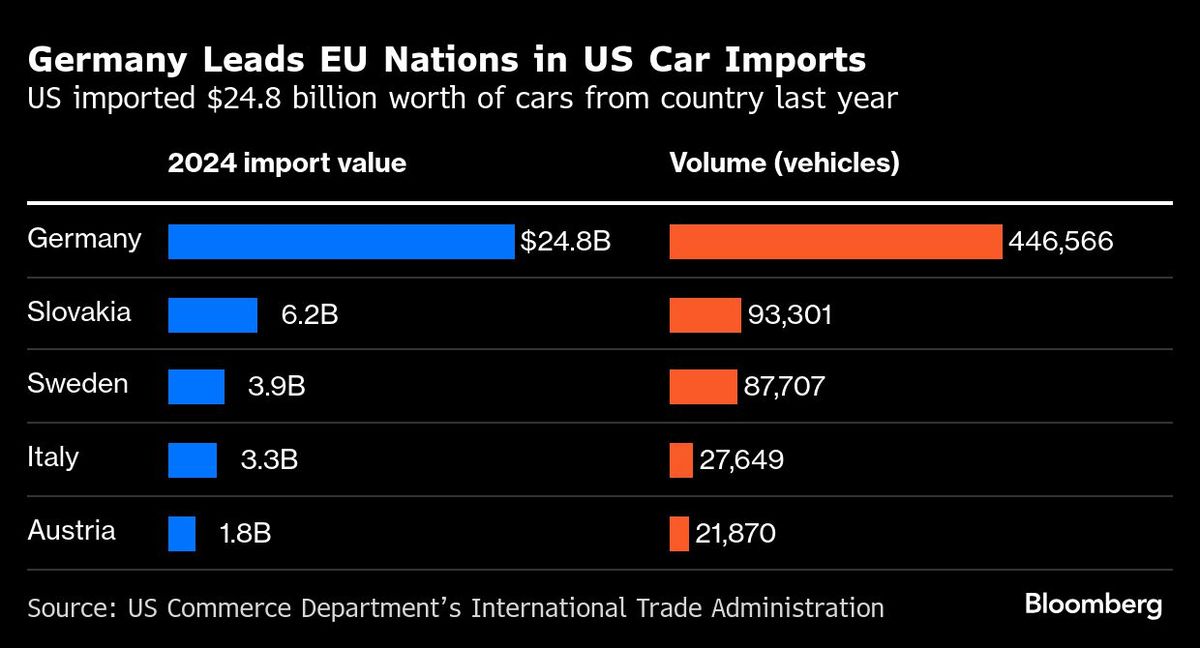
(March 27): Porsche AG and Mercedes-Benz Group AG will be hit hardest by US President Donald Trump’s latest trade salvo, facing a potential €3.4 billion (US$3.7 billion or RM16.2 billion) blow from new US tariffs on imported cars.
Trump’s additional 25% duties, to be collected from April 3, could wipe out around a quarter of Porsche and Mercedes’ projected 2026 operating earnings, according to Bloomberg Intelligence. To offset the impact, manufacturers may have to raise prices or shift more production to the US.
The levies threaten to upend the European auto industry’s reliance on exports to the lucrative US market. German carmakers are most at risk as they send more vehicles to the US than to any other country, including many of their higher-margin combustion-engine models like Porsche’s 911 sports car and Mercedes’ S-Class sedan.
Porsche shares declined as much as 5% in Frankfurt, with Mercedes’ stock falling as much as 5.2% and BMW AG dropping 4.9%. Volkswagen AG, which also owns Audi and Lamborghini, was down as much as 4.3%, while Aston Martin Lagonda Global Holdings plc slumped 8.9% in London.
Trump’s latest move is “a fatal sign for free and rules-based trade”, said Germany’s VDA cars lobby, urging Brussels to negotiate with Washington for a deal. Beyond Germany’s biggest automakers, the levies also threaten to hurt parts makers including Robert Bosch GmbH and Continental AG.
Most German automakers operate factories in the US where they produce cars both for local buyers and export. With the European Union weighing a response, any escalation of the trade war could further damage an industry already grappling with rising costs and muted demand.
Porsche, which is struggling with lower sales in China, may be most exposed. The luxury-car maker has steadily grown the last 15 years in the US, which just overtook China as its No 1 market in the world. But Porsche’s US dealers are entirely reliant on imports as the manufacturer operates no factory there.
“The tariffs place a heavy burden on companies and the industry’s tightly interwoven global supply chains,” said VDA president Hildegard Müller. The move has “negative consequences for consumers, especially in North America.”
Uploaded by Tham Yek Lee
- China's biggest state banks to raise US$71.6b to boost capital
- Four Chinese nationals detained for illegally entering Bangkok disaster zone to 'retrieve documents'
- Japan to give crypto assets legal status as financial products, Nikkei says
- Volvo Car brings back Samuelsson as CEO to steer turnaround
- Gold rises to record as trade-war concerns drive haven demand
- Japan's production rises most in 11 months ahead of new US tariffs
- South Korea's short-selling resumption set to entice global funds
- King, Queen perform Aidilfitri prayers at Federal Territory Mosque
- Asia braces for historic test of export model from Trump tariffs
- Temasek-backed 65 Equity makes European foray with Swiss pharma merger

